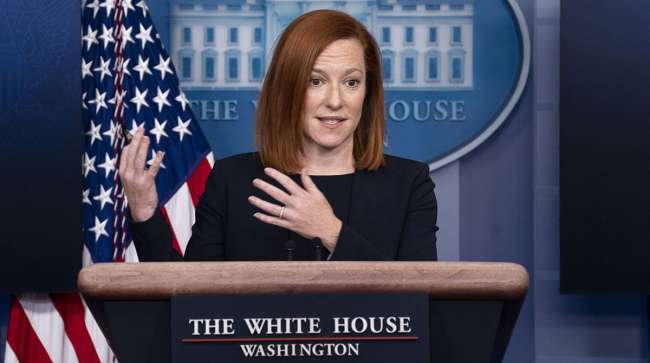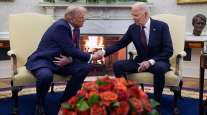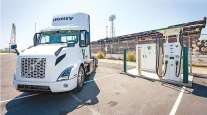Senior Reporter
White House Eyes Infrastructure After COVID-19 Relief Package

[Stay on top of transportation news: Get TTNews in your inbox.]
After work on a multitrillion-dollar coronavirus pandemic relief package is finalized, the White House is likely to pursue an agenda that includes comprehensive infrastructure policy.
White House Press Secretary Jen Psaki indicated recently that legislation centered on infrastructure matters promises to garner bipartisan appeal on Capitol Hill, noting potential for advancing a climate change-centric agenda this year.
Debate on the White House’s $1.9 trillion COVID-19 relief package continues, and congressional leaders have yet to schedule hearings or meetings on specific infrastructure funding proposals.
As I’ve said throughout my whole career: The middle class built this country, and labor built the middle class. This afternoon, I met with labor leaders to discuss the American Rescue Plan and how we’ll rebuild our infrastructure—creating good-paying, union jobs in the process. pic.twitter.com/3dyv23GvLq — President Biden (@POTUS) February 18, 2021
“Well, first, I will say our focus right now, and the president’s focus, is on the American Rescue Plan [COVID-19 aid] and doing everything he can to move that through Congress, to communicate with the American public, to convey why there’s money needed to reopen schools, to get shots in arms, to get direct checks out to the American people,” Psaki told reporters Feb. 17.
“I would not expect him to lay out next pieces of his agenda until that package is through and signed, and that relief is going out to the public,” she added. “Infrastructure is certainly an issue he’s had a long passion for. He does believe it creates good-paying union jobs. He thinks they can be done as clean energy jobs, but we’re going to focus our efforts at this point in time on the American Rescue Plan.”
Last month, President Joe Biden signed executive orders meant to establish a whole-of-government strategy to address myriad concerns related to climate change. The president explained he will prioritize programs that enhance infrastructure systems’ resilience to severe weather events.
U.S. Chamber of Commerce Letter to Congress by Transport Topics on Scribd
However, the White House and Congress have not identified requisite long-term, sustainable funding sources for adopting massive infrastructure legislation. The Highway Trust Fund is an account that backs national highway programs via exiguous revenue from fuel taxes. The 24.4 cents-per-gallon diesel tax and 18.4 cents-per-gallon gasoline tax rates were set in 1993.
Still, federal policymakers, often echoing stakeholders, express support for considering legislation that would update freight and passenger transportation systems, as well as ameliorate mobility grids and connectivity hubs.
“We should be forward-leaning when it comes to tackling the transportation needs of today and tomorrow in a way that works for all communities, instead of a one-size-fits-all approach,” Sen. Shelley Moore Capito (R-W.Va.), ranking member on the Environment and Public Works panel, said recently. “The EPW committee has a track record of delivering strong, bipartisan solutions that address a wide variety of our nation’s top infrastructure needs.”
“The American people desperately want us to bring our roads, trains and bridges out of the last century and into the future. And President Biden and I know that we need to do that in a way that builds back better, putting our transportation sector on a path to zero emissions and creating millions of good-paying jobs in the process,” added EPW Chairman Tom Carper (D-Del.).
ATA Buttigieg Letter by Transport Topics
A variety of freight stakeholders are urging the new administration and congressional leaders to establish a landscape that repairs and upgrades all-things transportation. These stakeholders insist infrastructure improvements would help the nation’s economy.
The U.S. Chamber of Commerce and the Bipartisan Policy Center, a think tank, are leading a coalition calling for the enhancement of a federal infrastructure funding package prior to July 4. This package should aim to update crumbling infrastructure, stimulate the economy, pursue climate change initiatives, promote fiscally responsible policies and enhance the approval process for federal projects.
RELATED: Infrastructure initiatives remain a top priority
“As a nation we must be able to build big things quickly to accelerate the economic recovery and build the resilient low-carbon economy of the future,” according to a statement from the coalition this month. “We need a durable commitment and clear strategy.”
In a message to the new leadership at the U.S. Department of Transportation, American Trucking Associations endorsed technology-driven solutions to form the basis for talks focused on infrastructure funding. ATA President and CEO Chris Spear told Secretary Pete Buttigieg Feb. 11: “As our nation continues to respond to the COVID-19 pandemic, the criticality of our transportation network and the supply chain merits a significant investment that will strengthen, revitalize and modernize our crumbling infrastructure.”
Want more news? Listen to today's daily briefing below or go here for more info:




